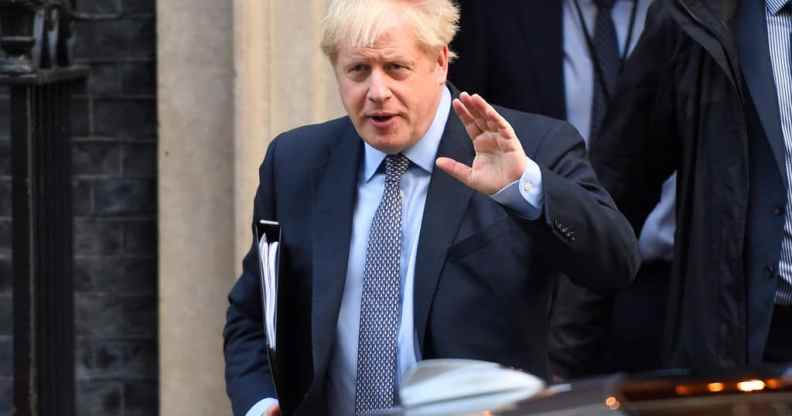Government condemned over latest delay to conversion therapy ban: ‘Deeply disappointing’

Boris Johnson leaving the House of Commons. (Peter Summers/Getty)
LGBT+ activists have expressed dismay after it emerged that the government’s planned public consultation on conversion therapy has been delayed.
The Tory government has repeatedly pledged to outlaw the traumatising practice, which has been discredited by every major psychiatric body.
In May, Queen Elizabeth II promised a conversion therapy ban would be brought forward during her speech at the State Opening of Parliament.
Immediately afterwards, the Government Equalities Office said legislation would be advanced following a public consultation process which would “ensure that the ban can address the practice while protecting the medical profession; defending freedom of speech; and upholding religious freedom.”
The public consultation was supposed to be launched in September – but it has now been pushed back by several weeks, according to BBC News.
It is now thought that the consultation might only be launched in late October – weeks after it was originally slated to take place.
LGBT+ people ‘remain at risk’ as long as conversion therapy is legal
Stonewall, the UK’s leading charity advocating for LGBT+ rights, condemned the delay on Twitter on Saturday (25 September).
It is deeply disappointing that the Govt has delayed its plans to #BanConversionTherapy. While this barbaric practise is legal, LGBTQ+ people remain at risk. The Govt must set a new deadline for the consultation as soon as possible. https://t.co/eofdaAJack
— Stonewall (@stonewalluk) September 25, 2021
“It is deeply disappointing that the Govt has delayed its plans to ban conversion therapy,” the organisation wrote. “While this barbaric practise is legal, LGBTQ+ people remain at risk. The Govt must set a new deadline for the consultation as soon as possible.”
Stonewall chief executive Nancy Kelley told BBC News that the government should set a new deadline for the public consultation “as soon as possible”.
Jayne Ozanne, an LGBT+ activist and survivor of conversion therapy, said in a statement: “I am very frustrated to hear of yet another delay in this long road to finally getting a ban on conversion practices, which LGBT+ people need and the public expect.
“Delay only emboldens the perpetrators and continues to cause life long trauma to their victims. The government keeps assuring us that they are ‘working at pace’ on this matter, but one has to question whose pace?!
“What is needed is a far greater sense of urgency and a commitment to a timetable that will reassure us that legislation will soon be passed.
“Indeed, many will wonder why we’re bothering to have a consultation at all when the evidence of the harm conversion practices cause is clear and when so many lives are being put at risk.”
Meanwhile, BBC News reported that the government has already been liaising with LGBT+ groups, religious organisations and “other interested parties” ahead of its public consultation on conversion therapy.
A spokesperson for the Equality Hub told BBC News: “As a global leader on LGBT rights, this government is committed to banning the practice of conversion therapy.
“We will be launching a consultation seeking views on our plans to ban the practice in a manner that is effective. More details will be announced shortly.”
The delay is just the latest setback in the long fight to ban conversion therapy in the UK. Theresa May’s government first promised to outlaw the practice in 2018 – but more than three years on, conversion therapy remains legal in all regions of the UK.
In the years that have elapsed since that initial promise, Tory ministers have repeatedly promised that legislation will be advanced – but they have also repeatedly kicked the can down the road.
Tensions escalated in March when members of the government’s LGBT advisory group resigned, claiming the Tories had created a “hostile environment” for LGBT+ people.
The panel was subsequently disbanded entirely, while Boris Johnson suggested that a ban would take time as it was a “technically complex” issue.
There was concern among LGBT+ activists when the government announced its plans for a public consultation in March after a similar approach led gender recognition reform to a dead end.
In 2018, the UK government launched a public consultation on proposed changes to the Gender Recognition Act (GRA), which would have simplified and streamlined the process of legal gender recognition for trans people.
The results, which showed broad support for reform, weren’t announced until September 2020. Days later, the government announced that it was scrapping plans to reform the GRA.

